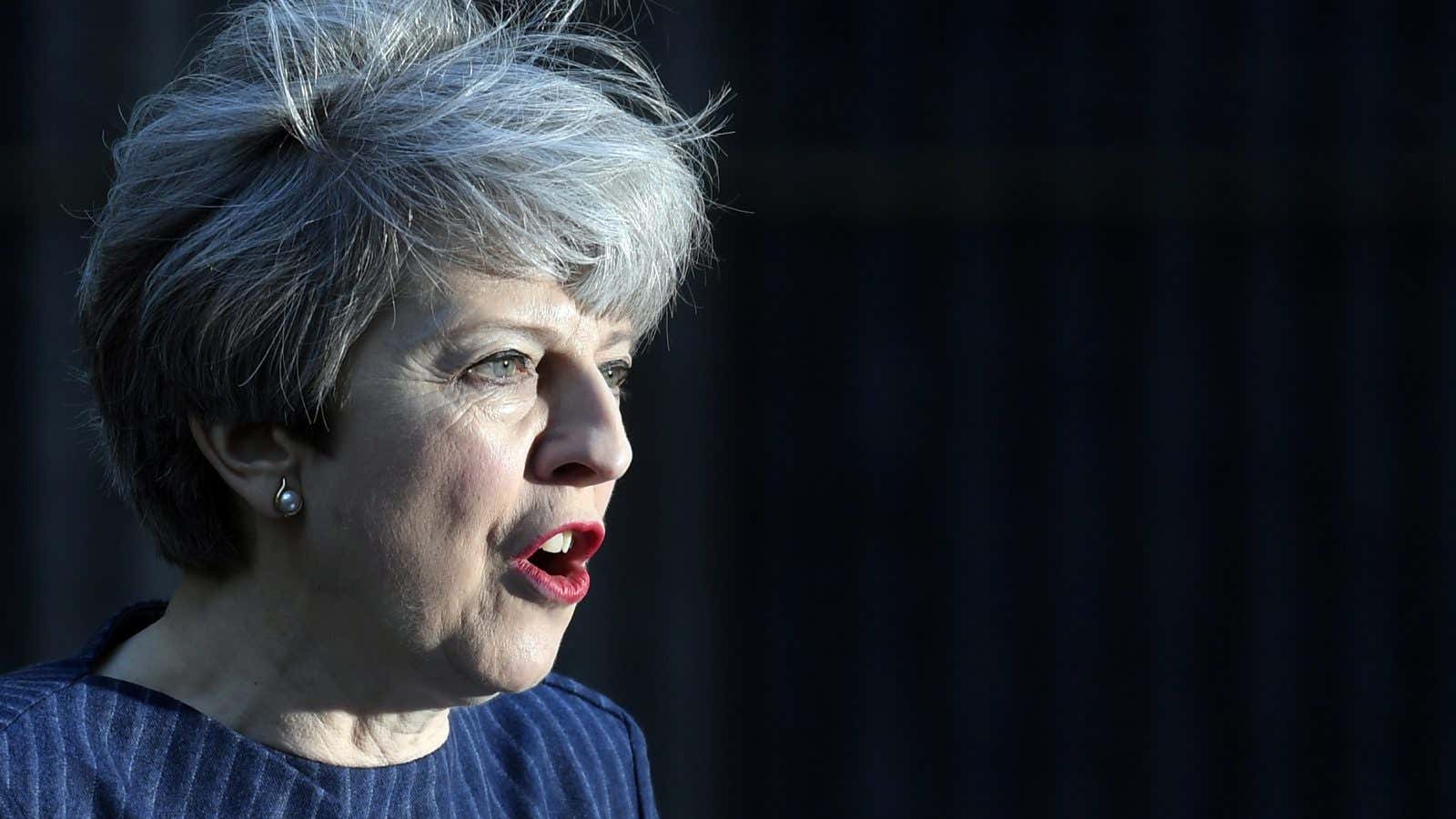British prime minister Theresa May shocked the country today by announcing a snap general election to be held in only eight weeks’ time, on June 8.
May came to power without a nationwide vote, taking over from David Cameron, who stepped down following the Brexit vote last June. The possibility of an early election, which would give May a fresh five-year mandate, has been a talking point ever since she took over. But there was little indication it would happen now, given May’s denials that a snap vote was needed throughout her tenure. Under UK rules, the next election was not due to take place until 2020.
The vote will be wedged between two other momentous votes in Europe. France is holding its two-round presidential election on April 23 and May 7. Germany will hold a federal election on Sept. 24.
Why did Theresa May call an election?
The UK’s ruling Conservative party, which holds a slim, 17-seat majority in the UK’s 650-member House of Commons, is leading the complex Brexit negotiations with the EU, facing stiff resistance from the other 27 members of the bloc and critics at home (remember that Brexit only passed by a 52-48% majority). The UK’s formal exit is due to take place by March 2019, two years after May officially started talks last month. There are a huge range of issues that need to be settled before then, lest the UK crash out of the EU without any transitional arrangements, trade deals, immigration agreements, or other vestiges of its former membership—a so-called “hard Brexit.”
Gaining a more solid majority following the vote would give May’s government a clearer mandate to negotiate Britain’s separation from the EU. ”At this moment of enormous national significance there should be unity here in Westminster, but instead there is division,” the prime minister said. ”I have concluded the only way to guarantee certainty and security for years ahead is to hold this election.”
What do the polls say?
The election is unwelcome news for opposition parties. Since the Brexit vote, the Conservatives’ lead over the rest of the field has opened up significantly. The prime minister’s party is now some 20 percentage points ahead of its closest challenger, the Labour Party. By some accounts, this would translate into a gain of some 50 seats in parliament.
Labour, the center-left party that has historically traded power with the Conservatives over the years, has been preoccupied with infighting since its stinging defeat at the last general election, in 2015. Jeremy Corbyn, the Labour leader, came to power with a huge mandate from rank and file party members, but has since been a contentious figurehead. He’s faced repeated calls for his resignation and more than one formal challenge. Corbyn says that his party welcomes the snap election, “offering the country an effective alternative” to the current government.
Other parties in the mix include the Liberal Democrats, who suffered a crushing defeat at the last election, but hope to regain some strength by campaigning on an anti-Brexit platform. At the other end of things is the UK Independence Party, which campaigned hard for Brexit but recently lost its only seat in parliament; it says that a vote for it is the only way to ensure a “clean, quick, and efficient Brexit.”
Then there’s the Scottish National Party, which hopes to build on the huge gains it made in last election. Its leader, Nicola Sturgeon, is campaigning for another vote on Scottish independence from the UK (which was promptly nixed by May), and will say that an increased majority north of the border will strengthen its case. It wants to hold a referendum on independence in late 2018 or early 2019.
How did the markets react?
On this morning’s news of an important but mysterious announcement by the prime minister, the pound initially dropped against the dollar, as uncertainty spooked investors. The British currency stabilized when May revealed the details of the vote, and when Labour confirmed that it would go along with the election plan—which is necessary to break the five-year election cycle written into parliament’s rules—the pound soared higher. Sterling now trades near a six-month high against the dollar (but remains 15% lower than it was before the Brexit vote).
Investors crave certainty, the well-worn saying goes, so even though a snap election was a big surprise, all signs currently suggest that the Conservatives will emerge with a much larger majority than now, removing any potential obstacles that could get in the way in the challenge that will consume the government for the next two years: divorce from the EU.
